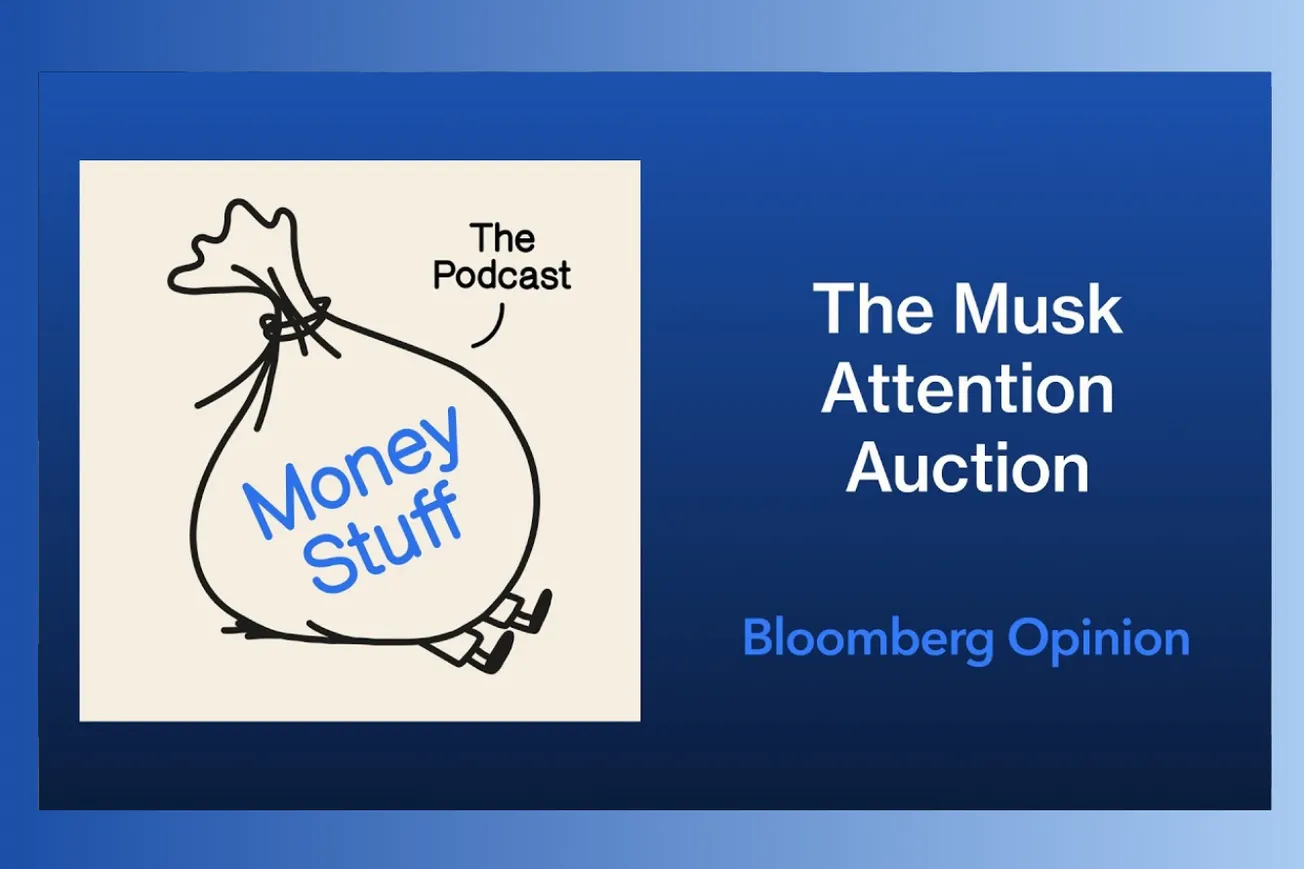Table of Contents
Tesla's board explores CEO succession planning while Elon Musk's distraction creates stock volatility, banks finally profit from Twitter's $13 billion debt after years of losses, and traditional asset managers rush to offer private market access to retail investors.
Bloomberg's Money Stuff podcast examines how CEO attention becomes a scarce resource in multi-company empires, why patient capital strategies succeed despite emotional turmoil, and whether private markets represent investment evolution or expensive regression from efficient public alternatives.
Key Takeaways
- Tesla board members contacted executive search firms amid concerns about Elon Musk's divided attention across six companies, though formal CEO replacement process remains unofficial
- "Techno King" title separation from CEO role could enable operational leadership while preserving Musk's visionary positioning for AI and robotics initiatives
- Banks successfully sold all $13 billion X debt at par value after three years of "hung loan" status, generating accounting profits despite interim emotional and career costs
- Twitter debt difficulties contributed to private credit boom as traditional banks pulled back from leveraged lending markets due to balance sheet constraints
- Capital Group-KKR partnership exemplifies wave of public-private debt funds targeting retail investors with 60% public bonds and 40% direct lending exposure
- Private market expansion reflects both institutional demand for higher fees and retail desire for access to high-growth private companies like Stripe and SpaceX
- Adverse selection concerns arise as private managers potentially allocate better deals to institutional clients while offering lower-quality assets to retail funds
- Public markets efficiency creates pressure for investment firms to develop less commoditized, higher-fee private alternatives to compete with low-cost index funds
Timeline Overview
- 00:00–18:30 — Tesla CEO Succession Speculation: Board search firm consultations, Elon Musk attention economy across multiple companies, "Techno King" versus operational CEO role separation possibilities
- 18:30–32:45 — X Debt Resolution Success Story: Banks sell $13 billion Twitter acquisition debt at par after three-year hold period, interim career casualties despite ultimate profitability
- 32:45–48:20 — Private Credit Market Impact: How hung loan experiences drove traditional banks from leveraged lending, creating opportunities for private credit expansion and institutional market share gains
- 48:20–62:15 — Retail Private Market Access Expansion: Capital Group-KKR public-private funds, State Street-Carlyle partnerships, Morgan Stanley and Goldman Sachs wealth management private offerings
- 62:15–75:30 — Private Markets Investment Philosophy: Efficiency versus fees debate, adverse selection concerns, emotional volatility benefits of illiquid asset holdings for long-term investment outcomes
The CEO Attention Auction: Tesla's Governance Dilemma
Tesla's board faces the unique challenge of managing a CEO whose attention operates as a scarce resource distributed across multiple high-value companies, creating governance tensions between operational needs and visionary leadership requirements.
- Wall Street Journal reports suggest some board members contacted executive search firms, though Tesla denies formal CEO replacement process exists
- Musk's promise to spend "significantly more time" with Tesla starting in May generated immediate positive stock reaction, demonstrating investor attention sensitivity
- Current "Techno King" and CEO dual titles could enable separation where operational CEO handles car business while Musk focuses on AI and robotics vision
- Twitter/X leadership model provides template with Linda Yaccarino serving as CEO while Musk maintains strategic control as "visionary kibbitzer"
- Board independence requires ability to pressure CEO for increased engagement while recognizing that hostile replacement would likely destroy company value
- Musk's text messages expressing reluctance to continue as CEO while worrying about succession demonstrate internal conflict between operational burden and strategic vision
The attention economy creates unprecedented corporate governance challenges where CEO engagement directly affects stock valuation but traditional removal threats could backfire catastrophically.
Patient Capital Vindicated: The X Debt Success Story
Banks that underwrote Twitter's $13 billion leveraged buyout debt ultimately achieved profitable outcomes despite three years of emotional turmoil and career casualties, demonstrating how patient capital strategies can succeed despite interim volatility.
- Final debt sales occurred at approximately 98 cents on the dollar, generating accounting profits for banks that held through difficult period
- High interest payments during hold period contributed to overall profitability despite early market offers at 50 cents on the dollar
- Individual banker careers suffered during interim period with firings and pay cuts despite ultimate deal success, highlighting personal versus institutional outcome divergence
- "Hung loan" status prevented banks from conducting additional leveraged lending due to balance sheet constraints, inadvertently boosting private credit market share
- XAI's potential $20 billion equity raise could enable early debt retirement, providing additional upside for patient debt holders
- Private credit market expansion partly traceable to traditional bank withdrawal from leveraged lending following X and other hung loan experiences
The episode illustrates how short-term emotional and career pressures can obscure long-term profitable outcomes, validating private market arguments about volatility reduction benefits.
Private Credit's Retail Revolution: Democratizing Illiquid Investments
Traditional asset managers increasingly partner with private credit firms to offer retail investors access to illiquid markets, representing either investment evolution or expensive regression from efficient public market solutions.
- Capital Group-KKR partnership creates mixed funds with 60% public bonds and 40% direct lending, targeting financial advisor distribution channels
- State Street-Carlyle discussions and Blackstone-Vanguard-Wellington joint ventures demonstrate industry-wide trend toward public-private hybrid products
- Morgan Stanley and Goldman Sachs develop internal private wealth offerings, bringing alternative investments to high-net-worth retail clients rather than purely institutional allocators
- 401(k) and target-date fund integration discussions suggest eventual mass market distribution of private market exposure through retirement accounts
- Private market expansion reflects both fee pressure on traditional active management and genuine retail demand for access to high-growth private companies
- ETF and mutual fund structures enable daily liquidity for underlying illiquid assets, creating potential mismatches during stress periods
The democratization trend raises questions about whether private market access represents genuine investment improvement or expensive alternative to solved indexing approaches.
The Efficiency Paradox: Why Private Markets Thrive Despite Public Market Success
The simultaneous success of low-cost public market indexing and expensive private market expansion creates apparent contradiction that reveals structural incentives favoring complexity over efficiency.
- Index fund success at 3 basis point fees makes traditional active management increasingly difficult to justify, driving institutional asset managers toward private alternatives
- Companies staying private longer reduces public market opportunity set while concentrating growth opportunities in private markets accessible mainly to institutional investors
- Financial intermediary fee structures strongly favor private markets over public alternatives, creating systemic bias toward complexity and illiquidity
- Retail investor demand for private market access reflects both performance expectations and exclusivity appeal of owning "cool private companies"
- Private credit offers borrowers flexibility and certainty in exchange for higher interest rates, while providing lenders additional yield spread over public bond alternatives
- Adverse selection risk emerges as private managers potentially allocate superior opportunities to institutional clients while offering retail investors lower-quality deals
The paradox suggests that market efficiency in public segments drives demand for less efficient but potentially higher-return private alternatives.
Governance Innovation Through Title Separation
Tesla's "Techno King" designation represents novel approach to separating visionary leadership from operational management within single corporate structure, offering potential template for other founder-led companies.
- Traditional chairman versus CEO distinction fails to capture Musk's desired role combining absolute authority with technology focus and reduced day-to-day operational responsibility
- SEC settlement preventing Musk from serving as chairman created opportunity for alternative governance structure through custom title creation
- Operational CEO could handle car manufacturing business while Techno King maintains control over AI, robotics, and strategic vision components
- Model enables talent retention for founders who want strategic influence without full-time operational burden, potentially applicable to other visionary-led companies
- Board independence remains challenging when custom titles provide founder with continuing control mechanisms outside traditional corporate governance structures
- Succession planning becomes more complex when leadership roles are bifurcated between operational management and strategic vision responsibilities
The innovation reflects broader trend toward customized governance structures that accommodate founder preferences while attempting to maintain institutional oversight and operational efficiency.
Common Questions
Q: Why doesn't Tesla's board simply fire Elon Musk if he's not paying attention?
A: Hostile CEO removal would likely devastate Tesla's stock price and motivate Musk to pursue AI and robotics projects at his other companies rather than within Tesla.
Q: How did banks profit from X debt that was widely considered a disaster?
A: Patient holding for three years enabled sales at par value plus high interest payments, though individual bankers suffered career consequences during the interim period.
Q: What drives traditional asset managers to partner with private credit firms?
A: Index fund success at ultra-low fees makes traditional active management difficult to justify, while private markets offer higher fee potential and retail demand.
Q: Are retail investors getting worse deals than institutions in private credit funds?
A: Adverse selection risk exists but partnerships and regulation provide some protection, though fee structures and deal allocation merit ongoing scrutiny.
Q: Why do companies stay private longer now than historically?
A: Abundant private capital, regulatory burden reduction, and higher intermediary fees in private markets create incentives to delay public offerings despite liquidity benefits.
The discussions reveal how corporate governance, debt markets, and investment management evolve to accommodate changing founder preferences, capital availability, and fee pressures while maintaining operational effectiveness and investor protection.
Practical Implications
- CEO attention becomes measurable corporate asset — Multi-company founders must allocate focus strategically, with board governance adapting to manage attention rather than traditional performance metrics
- Patient capital strategies require institutional commitment — Long-term profitable outcomes may involve interim emotional costs and career consequences for individual decision-makers despite ultimate success
- Private market democratization creates new fee structures — Retail investors gain access to previously institutional opportunities while paying higher fees than public market alternatives
- Governance innovation enables founder retention — Custom title structures allow visionary leaders to maintain strategic control while delegating operational responsibilities to professional management
- Market efficiency drives complexity demand — Success of low-cost indexing creates institutional pressure to develop less commoditized, higher-fee private alternatives
- Debt market disruption enables competitive shifts — Hung loan experiences drive traditional banks from leveraged lending, creating opportunities for private credit market expansion
- Adverse selection risks require ongoing monitoring — Private market retail expansion necessitates regulatory oversight and structural protections against institutional versus retail deal quality disparities
- Corporate succession planning must accommodate founder psychology — Traditional replacement threats may backfire with visionary leaders, requiring alternative engagement and retention strategies
The evolution demonstrates how financial markets adapt to accommodate changing participant preferences, regulatory constraints, and competitive pressures while attempting to maintain efficiency and investor protection across different market segments and participant types.





